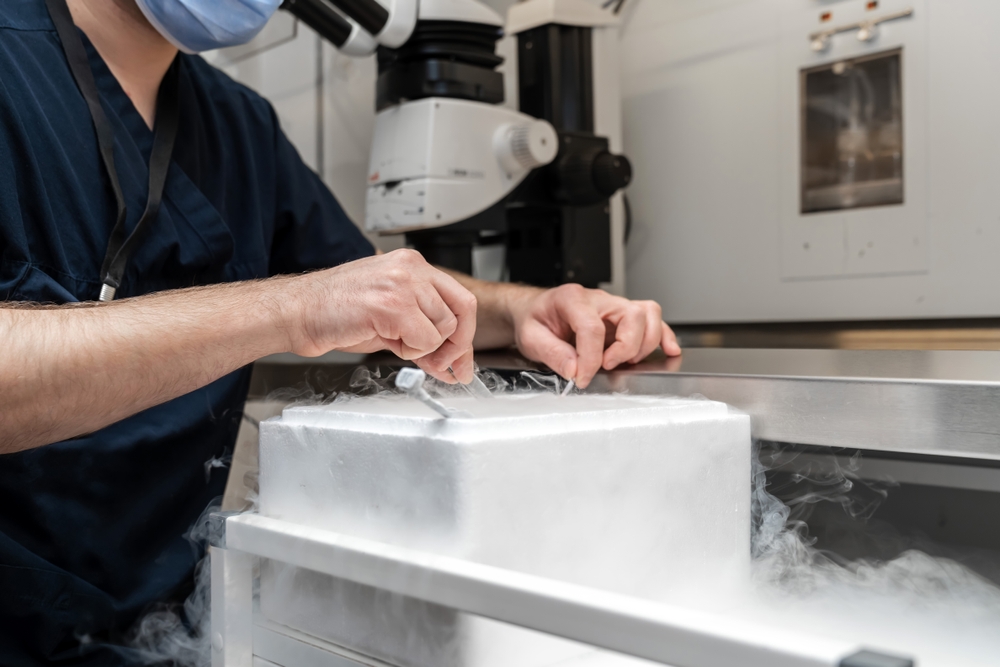In India, societal expectations and career aspirations often push back the age of starting a family. While focusing on education and building a fulfilling career is empowering, it can sometimes lead to a delay in parenthood. Egg freezing offers a beacon of hope for women who want to prioritize their goals while preserving their fertility. But is it the right decision for you?
This comprehensive guide dives deep into egg freezing in India, exploring its benefits, potential drawbacks, and crucial factors to consider before making this life-altering choice.
What is Egg Freezing?

Egg freezing, also known as oocyte cryopreservation, is a fertility preservation technique that involves extracting mature eggs from a woman’s ovaries and freezing them at a very low temperature for future use. These frozen eggs can then be thawed, fertilized with sperm through In Vitro Fertilization (IVF), and implanted in the uterus for a potential pregnancy.
Why Consider Egg Freezing?
The decision to freeze eggs is a deeply personal one. Here are some reasons why Indian women might consider this option:
- Focus on Career: India’s booming job market offers exciting opportunities for women. Egg freezing allows them to pursue their professional aspirations without compromising their future family plans.
- Later Marriage: The average age of marriage in India is rising. Egg freezing empowers women to delay marriage without worrying about a decline in fertility.
- Medical Conditions: Medical treatments like chemotherapy or radiation can harm a woman’s fertility. Egg freezing offers a chance to preserve fertility before such procedures.
- Endometriosis or PCOS: These conditions can affect fertility. Egg freezing can provide a safety net for women diagnosed with them.
Benefits of Egg Freezing
- Preserves Fertility Potential: Egg freezing allows women to maintain their fertility window, offering greater control over their family planning timeline.
- Increased Pregnancy Rates: Studies show that using eggs frozen in a woman’s 20s or early 30s leads to higher pregnancy success rates compared to using eggs frozen at a later age.
- Improved IVF Outcomes: Younger, healthier eggs generally lead to better quality embryos, increasing the chances of a successful IVF cycle.
- Empowerment and Choice: Egg freezing offers women the freedom to make informed decisions about their reproductive health.
Things to Consider Before Freezing Your Eggs
Egg freezing is a significant medical procedure with emotional and financial implications. Here are some key factors to consider:
- Age: Egg quality naturally declines with age. The ideal time for egg freezing is typically in the late 20s or early 30s.
- Cost: The cost of egg freezing in India can vary depending on the clinic, location, and number of cycles required. It’s crucial to factor in medications, monitoring, and storage fees.
- Success Rates: While egg freezing technology has advanced, it’s not a guarantee of a successful pregnancy. Success rates depend on factors like age at freezing and the number of mature eggs retrieved.
- Emotional Considerations: The process can be emotionally demanding. Consider seeking support from a counselor or therapist to navigate the associated feelings.
How to Decide if Egg Freezing is Right for You
Here are some steps to guide you:

- Consult a Fertility Specialist: A fertility specialist can assess your individual situation, discuss your fertility goals, and explain the egg freezing process in detail.
- Understand the Costs: Get a clear picture of the financial investment involved, including potential hidden costs. Explore financing options offered by some clinics.
- Research Clinics: Choose a reputable fertility clinic with experienced doctors and advanced technology.
- Consider Your Support System: Having a strong support system of family and friends can be invaluable during this process.
- Weigh the Pros and Cons: Carefully evaluate both the advantages and potential drawbacks of egg freezing before making a decision.
The Egg Freezing Process
The egg freezing process typically involves several steps:
- Initial Consultation: This involves discussing your medical history, fertility goals, and expectations with the fertility specialist.
- Ovarian Stimulation: Medications are used to stimulate the ovaries to produce multiple mature eggs.
- Egg Retrieval: A minor surgical procedure is performed to collect the mature eggs from the ovaries.
- Egg Freezing: The retrieved eggs are frozen using a process called vitrification for future use.
- Storage: The frozen eggs are stored in a special cryogenic tank at the clinic.
Financing Options for Egg Freezing in India
The financial aspect is a significant consideration for many women contemplating egg freezing. Here are some financing options that might be available in India:
- Internal Clinic Financing: Some fertility clinics might offer in-house financing plans with flexible payment options. Explore these options with the clinic’s financial team.
- Medical Loans: Several banks and financial institutions in India provide medical loans specifically for fertility treatments. Research different lenders and compare interest rates and loan terms.
- Employer-Sponsored Health Insurance: Some progressive companies are starting to include fertility treatments in their health insurance plans. Check with your HR department to see if your employer offers such coverage.
Success Rates of Egg Freezing
It’s important to understand that egg freezing is not a guarantee of a successful pregnancy. The success rates depend on several factors, including:
- Age at Egg Freezing: Women who freeze their eggs in their 20s or early 30s typically have higher success rates compared to those who freeze at a later age.
- Number of Eggs Retrieved: The more mature eggs retrieved, the greater the chances of a successful pregnancy. Age and ovarian reserve play a role in the number of eggs retrieved.
- Quality of Thawed Eggs: Not all frozen eggs survive the thawing process. The success rate also depends on the quality of the thawed eggs.
- IVF Success Rates: The overall success of using frozen eggs also depends on the success rates of the IVF clinic and the quality of the sperm used for fertilization.
The Future of Egg Freezing
Egg freezing technology is constantly evolving. Here’s a glimpse into what the future might hold:
- Improved Vitrification Techniques: Advancements in vitrification techniques might lead to a higher survival rate of frozen eggs, potentially improving success rates.
- Cost Reduction: As the technology becomes more widespread, the cost of egg freezing might decrease, making it more accessible to a broader range of women.
- Genetic Testing of Frozen Eggs: The possibility of genetic testing on frozen eggs might become more prevalent, allowing for the selection of healthier embryos for implantation.
Read Also : The Science Behind Egg Freezing: Process and Benefits
Making an Informed Decision
Egg freezing can be a powerful tool for women who want to take control of their fertility timeline. By carefully considering the factors discussed above, consulting with a qualified fertility specialist, and exploring available resources and support, you can make an informed decision that aligns with your individual goals and circumstances.
Remember
Egg freezing is a personal choice. There’s no “right” or “wrong” answer. This guide aims to empower you with the knowledge and resources to make the best decision for your future.pen_sparktunesharemore_vert
